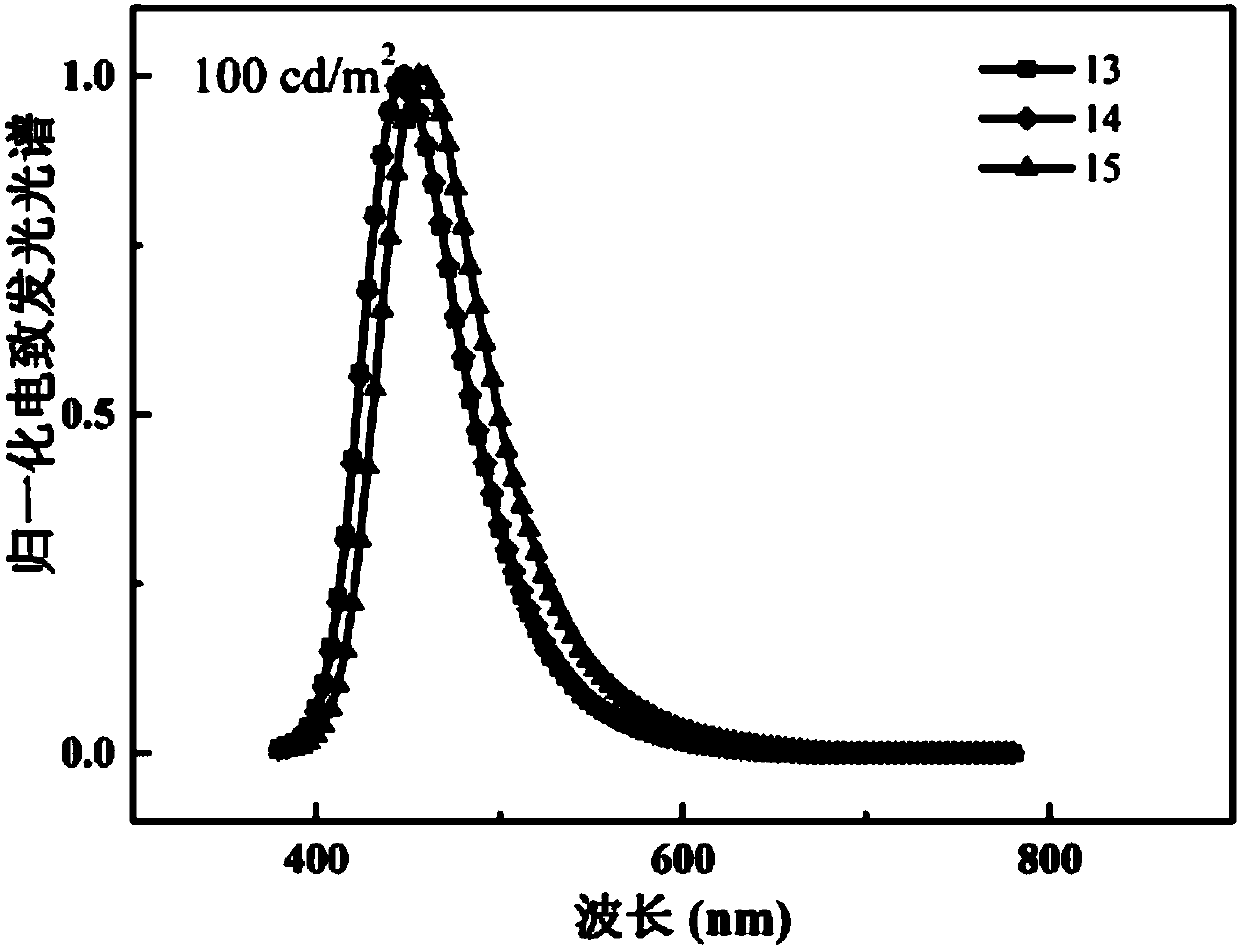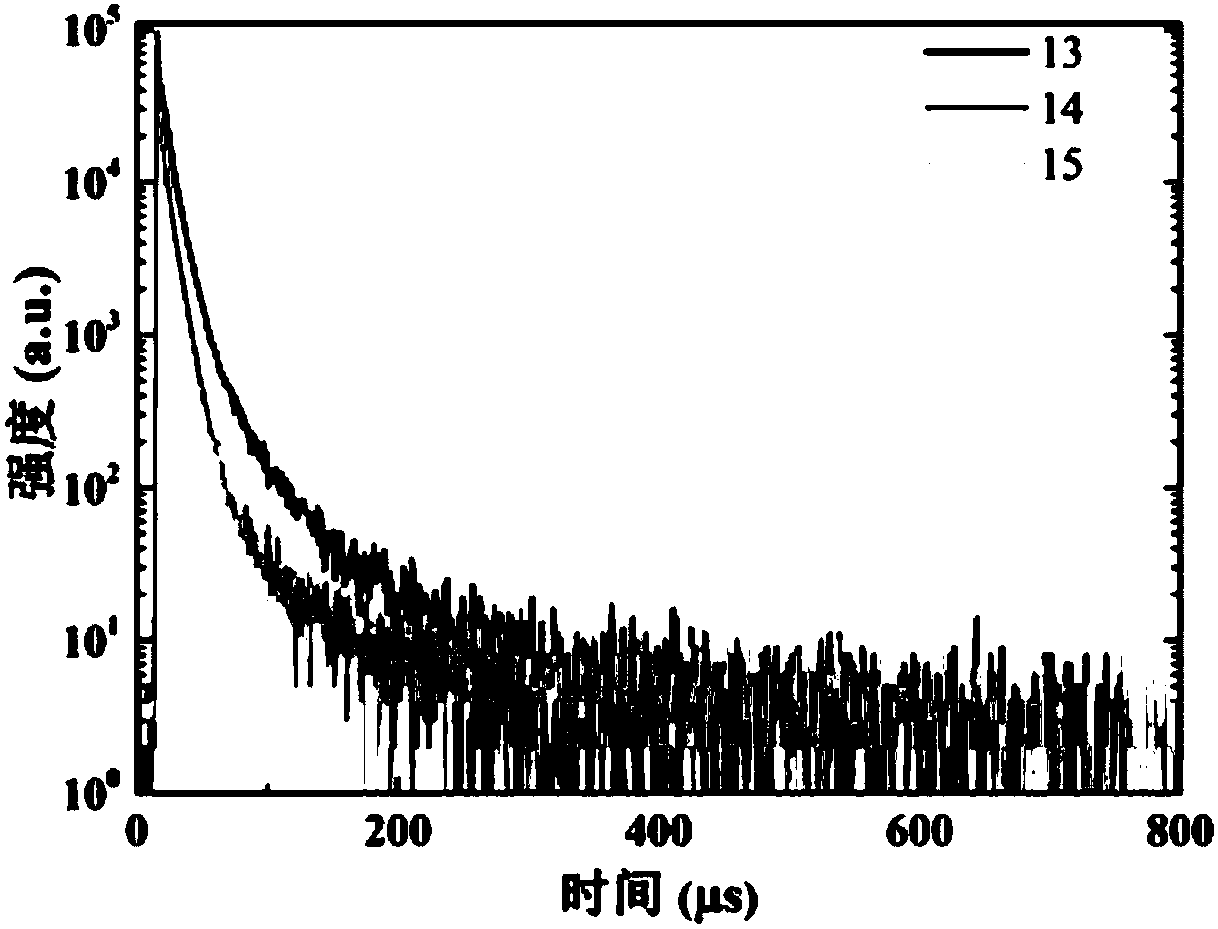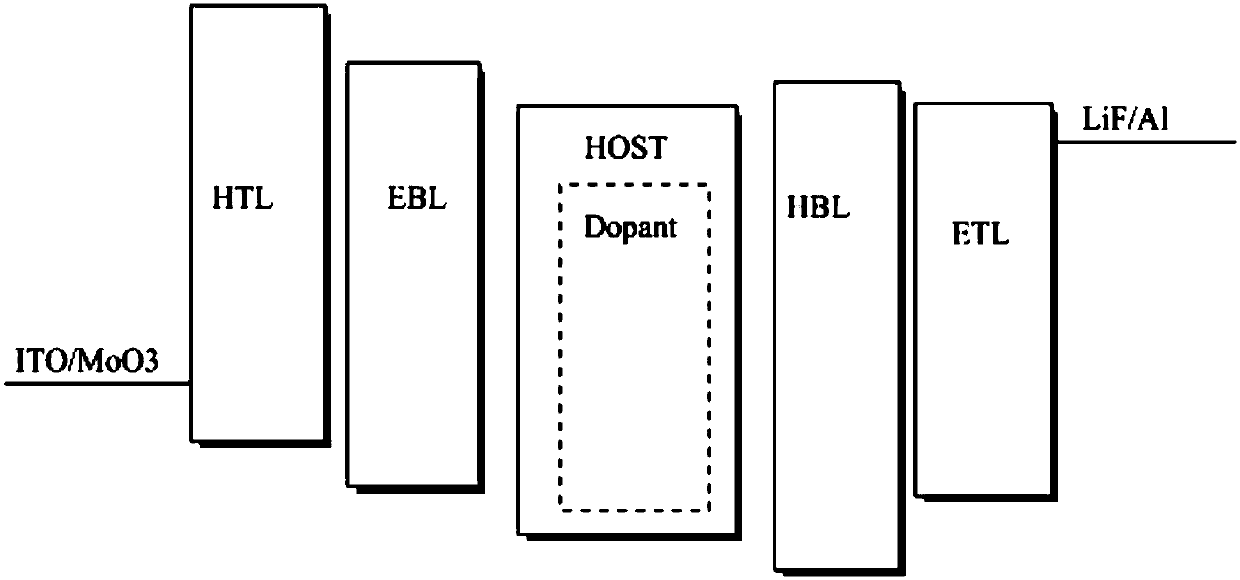Terpyridine derivative and preparation method and application thereof as well as device
A technology of terpyridines and derivatives, applied in the field of terpyridine derivatives and their preparation, can solve the problems of poor stability, low efficiency and the like
- Summary
- Abstract
- Description
- Claims
- Application Information
AI Technical Summary
Problems solved by technology
Method used
Image
Examples
Embodiment 1
[0039]
[0040] (5-(4-([2,2':6',2"-terpyridine]-4'-yl)phenyl)-12,12-dimethyl-5,12-dihydroindeno[1 , 2-c] carb) preparation:
[0041] (1) In a dry 500ml two-necked flask, 3-carbazole boronic acid pinacol ester (15g, 51mmol), o-dibromobenzene (14.5g, 61.2mmol), toluene (120mL), ethanol (60mL) Add 2mol / L potassium carbonate solution (60mL), first ultrasonic for 5-10 minutes, then quickly stir and blow nitrogen for 5 minutes, quickly add catalyst tetrakis(triphenylphosphine)palladium (1.8g, 1.53mmol), and blow nitrogen in large quantities 10 minutes. Heated to 100°C and stirred at reflux for 12h. During treatment, extract first, spin dry, and use petroleum ether and dichloromethane column chromatography to obtain a white solid product 3-(2-bromophenyl)-9H-carbazole with a yield of 93%.
[0042] (2) 3-(2-bromophenyl)-9H-carbazole (20.73g, 64.4mmol), di-tert-butyl dicarbonate (19.67g, 90.13mmol) and 4-dimethylaminopyridine (0.787g, 6.44mmol) was placed in a 500mL single-necke...
Embodiment 2
[0047]
[0048] (5-(4-([2,2':6',2"-terpyridine]-4'-yl)phenyl)-12,12-diphenyl-5,12-dihydroindeno[1 ,2-c]carba) preparation
[0049] (1) In a dry 500ml two-necked flask, 3-carbazole boronic acid pinacol ester (15g, 51mmol), o-dibromobenzene (14.5g, 61.2mmol), toluene (120mL), ethanol (60mL) Add 2mol / L potassium carbonate solution (60mL), first ultrasonic for 5-10 minutes, then quickly stir and blow nitrogen for 5 minutes, quickly add catalyst tetrakis(triphenylphosphine)palladium (1.8g, 1.53mmol), and blow nitrogen in large quantities 10 minutes. Heated to 100°C and stirred at reflux for 12h. During treatment, extract first, spin dry, and use petroleum ether and dichloromethane column chromatography to obtain a white solid product 3-(2-bromophenyl)-9H-carbazole with a yield of 93%.
[0050] (2) 3-(2-bromophenyl)-9H-carbazole (20.73g, 64.4mmol), di-tert-butyl dicarbonate (19.67g, 90.13mmol) and 4-dimethylaminopyridine (0.787g, 6.44mmol) was placed in a 500mL single-necked ...
Embodiment 3
[0056]
[0057] (5'-(4-([2,2':6',2"-terpyridine]-4'-yl)phenyl)-5'H-spiro[fluorene9,12'indeno[1,2 -c] Preparation of carbazole])
[0058] (1) In a dry 500ml two-necked flask, 3-carbazole boronic acid pinacol ester (15g, 51mmol), o-dibromobenzene (14.5g, 61.2mmol), toluene (120mL), ethanol (60mL) Add 2mol / L potassium carbonate solution (60mL), first ultrasonic for 5-10 minutes, then quickly stir and blow nitrogen for 5 minutes, quickly add catalyst tetrakis(triphenylphosphine)palladium (1.8g, 1.53mmol), and blow nitrogen in large quantities 10 minutes. Heated to 100°C and stirred at reflux for 12h. During treatment, extract first, spin dry, and use petroleum ether and dichloromethane column chromatography to obtain a white solid product 3-(2-bromophenyl)-9H-carbazole with a yield of 93%.
[0059] (2) 3-(2-bromophenyl)-9H-carbazole (20.73g, 64.4mmol), di-tert-butyl dicarbonate (19.67g, 90.13mmol) and 4-dimethylaminopyridine (0.787g, 6.44mmol) was placed in a 500mL single-n...
PUM
 Login to View More
Login to View More Abstract
Description
Claims
Application Information
 Login to View More
Login to View More - R&D
- Intellectual Property
- Life Sciences
- Materials
- Tech Scout
- Unparalleled Data Quality
- Higher Quality Content
- 60% Fewer Hallucinations
Browse by: Latest US Patents, China's latest patents, Technical Efficacy Thesaurus, Application Domain, Technology Topic, Popular Technical Reports.
© 2025 PatSnap. All rights reserved.Legal|Privacy policy|Modern Slavery Act Transparency Statement|Sitemap|About US| Contact US: help@patsnap.com



